Human rights
A student is judged by…
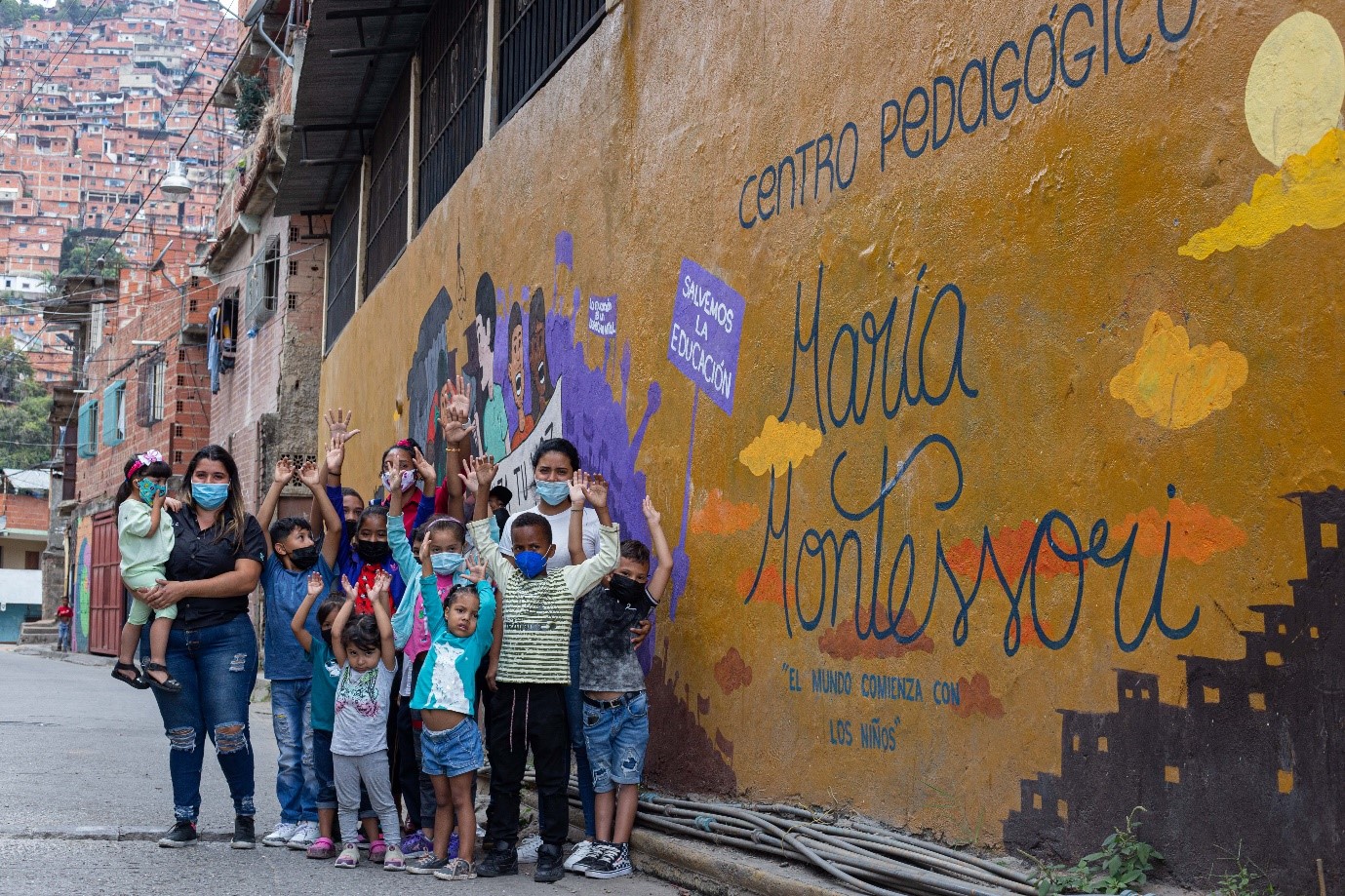
Students and teachers from Pedagogical Center María Montessori, in the San Blas neighborhood of Petare. April 2022.
© photography by Cristian Hernández. Un Estado de DerechoWritten by Antonio Canova Mary Elizabeth León, members of the team of Un Estado de Derecho
The first thing a Venezuelan student encounters when opening the official History of Humanity textbook are the thoughts of Eduardo Galeano, author of Las venas abiertas de América Latina. The Social Sciences textbook for the second year of high school belongs to the called Colección Bicentenario, fully subscribed, even the latest editions, by the “Supreme Commander of the Bolivarian Revolution” Hugo Chávez. Each print run has hundreds of thousand copies, all in free circulation.
In the first chapter of this school text, Origin and evolution of human beings, a synthesis of Charles Darwin’s theory is overlapped by an extensive exposition of contributions by Friedrich Engels, The Communist Manifesto co-author, and then, less profuse, by the contributions of American anthropologist, lawyer, ethnologist and collectivist shepard, Lewis Morgan. At the end of this topic, there are listed five questions for the students, who are encouraged to reflect and share their answers. The fifth and last question is “Do you believe what Morgan said can be achieved: a higher level of civilization when the collective property of the fundamental resources is restored?”
To decide, it is better to have only two choices.
In the same reglementary book, studied by ten of thousands of teenagers, excerpts like these can be found: “The world is struggling today, leaning between a painful mutation of the devastating nature of capitalism walking towards barbarism and originated in the United States, as the centre of the empire, or towards the search for a new civilization based on the socialization of natural resources for the satisfaction of every human being’s needs in a society where men and women are free and equal?”
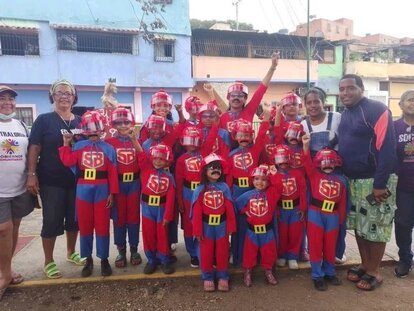
In Carnavales, 2022, one of the teaching methods from the Ministry of Education was the “Súper Bigote” costume. The comic protagonist, produced by and broadcasted on an official channel, is a hero that fights against yankee imperialism.
© photography by Un Estado de DerechoGoal: freedom
In Un Estado de Derecho (UED) we believe in freedom. Our goal is to promote it, transforming the Venezuelan and every Hispano-American society into a prosperous and peaceful place. That is why we focus on the human right to education.
It is sometimes forgotten, but we can really understand it through indoctrination. We believe that genuine inclusion is only possible in a system devoid of ideological rectories. How can we achieve comprehension and respect towards diversity in a totalizing teaching system? Can we expect true commitment with tolerant values? What about freedom?
In Venezuela, education is a State monopoly. Every program, content, text, as we saw, are dictated and consented by a State that covers, with almost 30 thousand schools, 80% of the student population in the country. Private education is also subject to rigorous government supervision. It is in plain sight: the social control system applied by the Bolivarian Revolution has one of its foundations on the public schools. Nobody is surprised that the directors are members of the socialist party. Adán Chávez, the ex-president’s deceased brother, was the Minister of Education. Is it odd that the class teaching method is the same as the one tested by von Bismarck, at the end of the nineteenth century in the Prussian empire, designed more for training soldiers willing to die and kill, than for free citizens?
The History of Humanity textbook is, of course, a continuation of the tale that the mandated system tells students, even before they learn how to read.
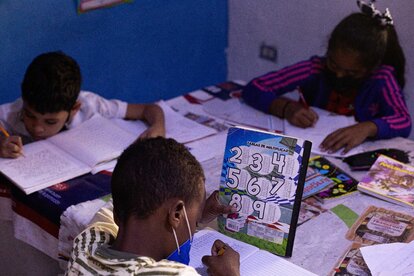
Right and Obligation
If there is something good about the State's intervention on the education system in Venezuela, it is how deficient it is exercised. In the Constitution, in the laws, in the number of declarations, treaties and international pacts, the human right to an education is guaranteed; but even if it is proclaimed here and there, the truth is that the Venezuelan State has not and will never be able to ensure the right provision of this so-called social right.
We know that the nature of all bureaucracy is inefficiency. Let 's think it through: from a centralized and planned exercise of power it’s impossible to take on the complex task of educating millions of different children; building and managing thousands of schools; giving the teachers their deserved pay; creating a virtuous environment where each and every public employee does their best. It is all a fantasy. Eventually, from so much frustration, magic and vocation run dry. As money does, even more when we know the true incentives of the politicians at the head of the government. In the end, students do not learn.
This is a reality that manifests in undeniable facts that, in spite of them, keeps on going, supported more by the predominant view than human rights: the view of who at this point, even from liberalism, still believe that at least in fundamental areas such as education, the State could still -this time- honour the uncountable promises repeatedly unfulfilled. The issue is that this cannot be achieved even when said “obligation” is used for indoctrination.
In Venezuela, the educational process is almost non-existent. It already was, before March 2020 when face-to-face classes were formally suspended because of the Covid-19 pandemic. By then, in full hyperinflationary ferocity, it was known that teachers were not able to afford a traveling fare to get to their teaching centers because of their salaries dropping to the equivalent of less than five dollars a month. The state of the educational infrastructure was also known: in ruins, lacking basic services like water or electricity.
This year in the middle of March, the president Nicolás Maduro ordered the return to normal activities and announced a salary increase for educators. May started and the situation did not improve: teachers were absent and the schools’ state was frankly worse. Even the directors of the magisterial centrals adjacent to the government considered the wages insufficient: a salary in bolivars, each day devaluing more.
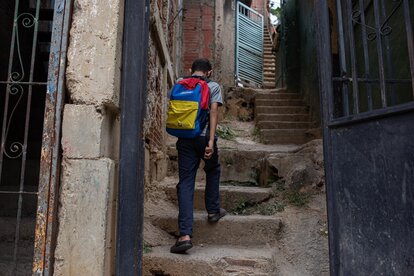
A Petarean student, with his school bag distributed by the Ministry of Education, heads to class at an alternative education center. April, 2022.
© photography by Cristian Hernández. Un Estado de DerechoFertile Soil
In the middle of destruction, we have seen a unique opportunity rise for the seeding of freedom. Crisis means change.
Between September and December in 2021, we followed the signs of a phenomenon happening all over the country. We undertook a field study in Petare, the biggest, most populated and violent neighbourhood in Latin America. We investigated this disadvantaged and emblematic zone in Caracas. It was found that 39% of students use low-cost private teaching services, offered by female educators to the community known as “tareas dirigidas” or directed assignments.
We found that 64% of the children that make use of this private education service pay between one or five dollars a week, are also enrolled in free public schools. Their parents are relying on options apart from the State. Informal educational activities. Isn’t this an exciting way of self-protecting the right to education?
In Petare, and not without its share of difficulties and hostilities, we kept a record of 62 houses with “tareas dirigidas” and interviewed each and every one of the teachers (all women) that work there. These entrepreneurs gave us details about the service characteristics, economical sustainability, how the community values them, the parent’s level of satisfaction with their work and the learning impact it had on their students. All this data is available for anyone interested in this recent picture of the human right of education in Venezuela.
We also saw how in these enterprises the teachers give personalized pedagogical attention, tailored to every student’s needs, their capacities, interest, far from the official program that indoctrinates them. A free education, born from competition, is carried out.
We know of many cases where boys and girls around ten years old start to get interested in science and the arts; their parents see that. Moreover, they are the ones who decide how to educate their children, the method, to what end and by who
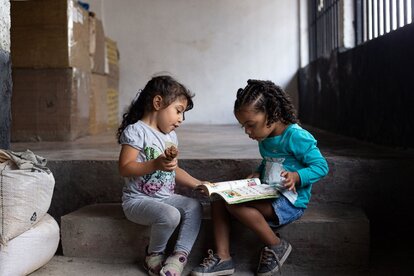
Two students of the Maria Montessori Pedagogical Center. April 2022.
© photography by Cristian Hernández. Un Estado de DerechoWater them or cut them down?
We have seen that the directed assignments centers do more than just assigning tasks and homework, and are rapidly multiplying at a significant speed throughout Venezuela. It seems ubiquitous and possible, as it has been documented more than two decades ago in other poor countries of the world by Professor James Tooley, author of El bello árbol or The Beautiful Tree, a book that inspired our research.
A still ongoing field study that began in January 2022 in Montalbán, a rural municipality about 200 km to the west of Caracas, is showing a growth of low-cost businesses and services, with the same characteristics as the ones in Petare. In Montalbán, in the Carabobo State, with 28 thousand people living in extreme poverty, there are 25 study centers: 24 from the government and one dying private school with just 56 students enrolled.
There, in the Carabobo Mountains, we have found the same that in Petare: parents come to private agreements with (female) town teachers, under the “tareas dirigidas” denomination, in their houses, in alternative teaching centers. To this day, we have counted 49; some have up to 25 students. Microschools.
In both Petare and Montalbán, the teachers have told us that the demand is growing. Tooley managed to spark the interest of financiers in the communities and abroad that have invested in low cost private schools in Africa and India. As enterprises, they are sustainable as we have seen in Venezuela (53% of the teachers in our study reported that their main income comes from this activity).
There are many necessities, starting with the fact that most of these alternative centers do not have internet access. Not to mention furnishings, school supplies and tech resources. Tooley has proved this phenomenon is scalable. How can we not plant these seeds of free education? What if international cooperation supported them instead of wrongly investing their funds into structurally inefficient public school systems?
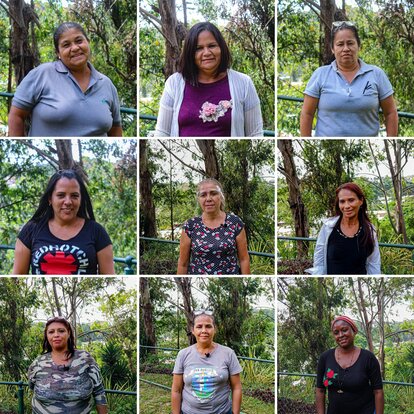
Teachers in Petare who turned their homes into classrooms.
© photography by Un Estado de DerechoLiberal Realism
We talked about a Venezuela in a humanitarian crisis, devastated for more than two decades by socialist failure, with 77% of its population in extreme poverty. That is why we view with concern the neighbouring countries' efforts on committing or persisting on a centralized education model where the State is the protagonist: a model tested a thousand times, a failed one.
At the same time, at UED we have been conducting other interdisciplinary, comparative and correlating studies of the human right to education in Latin-American, countries according to their constitutional foresight. We have found a clear tendency: a higher normative regulation is associated with more public powers or prerogatives meaning families play a lesser role in their children’s education.
Centralization in education shows itself like a negative factor, relevant, like many others that make up the complex systems that lead countries away from prosperity. Obstacles to freedom in education distance us from the longing for stable, egalitarian and prosperous societies.
This was proven as well by a European civil organization (Novae Terrae Foundation) with their Global Index on Freedom of Education (2016) that included the parents’ rights. The index compares 136 countries from every continent, evaluating the availability of private schools, the family's freedom of choice for their children’s education, the existence of government aid for these new alternative education enterprises and the relationship between the private and public enrolment ratio. All Latin-American countries included, except Chile and Peru, are below average. Close to and behind Venezuela (ranking 66th), with highly centralized education systems are: El Salvador, Dominican Republic, Colombia, Costa Rica, Paraguay, Honduras, Panamá, Haiti and, in second to last, Cuba.
In other words, both our results and the ones gathered by the international educational freedom indicator show a clear geographical tendency towards a state-oriented idea of this human right that hinders the inclusion of self-protecting mechanisms. In the same way, both researches, when compared, reach a similar conclusion: more freedom and private cooperation in correlation with human right’s satisfaction result in a higher rate in the global democracy index, good governance and human development.
The evidence is there, everywhere. We are motivated by the belief that we are contributing with in-depth research that will help in finding a synergic solution, realist and urgent, to this problem, this tragedy, for public Venezuelan education; not so different from the current situation of neighbouring countries.
We gave an answer that goes beyond the one consistently given by human development specialists: centralization and more state “investment”; meaning, more power of choice, and especially more money for the politicians.
Professor Tooley, Vice rector of the University of Buckingham in England and low cost education world champion, already knows about the first findings from Petare and Montalbán. He supports the research efforts of the UED and encourages us to keep going, go deeper and to reach out to other Latin-American countries.
The Friedrich Naumann Foundation for Andean Countries has fully committed to our pursuit of freedom of education in Venezuela. Apart from appreciating the value our field studies bring, they have supported us in a series of key activities for the understanding and diffusion of a liberal proposal throughout the region.
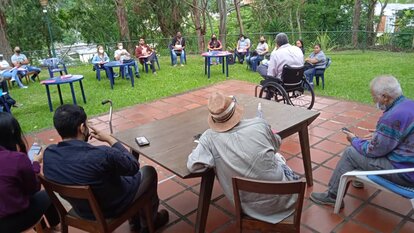
Professor Antonio Canova, General Director of Un estado de Derecho (UED) delivers the first words of the Educational Freedom Course, El Bello Arbol Petare, to participants and guests (teachers, private school principals, community activists, human rights defenders, among others).
© photography by Mary Elizabeth León, Un Estado de DerechoFreedom of Education
The appearance of this unplanned educational order in disadvantaged neighbourhoods and populations from a country in a state of humanitarian emergency challenges the statistical, traditional perspective of the way education is understood. It questions the theory of human rights itself. Theory, so antiquated and unsuccessful that, giving our blind trust to leaders and politicians, insist on taking away the parent’s responsibility to educate and decide on their children’s future: it restricts their freedom of educational choice.
While the traditional development experts see in a bad light these alternative solutions of education, the poorest families in Venezuela, like the entrepreneurial teachers and the children, benefit from its effects. Is there a better example of positive incentive alignment?
We are interested in continuing our studies from different perspectives, empiric and interdisciplinary, of these unplanned manifestations, these spontaneous orders that have surged from the bottom to the top, born from need and expressed through creativity and problem-solving autonomy.
Some ignore this reality, even discredit it. In UED we see these alternative centers more like weapons of mass instruction, that within a minimum frame of freedom become useful, quality teaching tools that even poor families are willing to pay for.
And, above all, they are free from indoctrination.
We insist on this from a nation where, paradoxically, the majority of non-governmental organizations do not defend the human right to education…governmental.
It will be impossible to push for realistic solutions to the pressing needs and issues in our societies without an alternative perspective of education beyond statistics. There will never be property, markets and prosperity as well as justice, health and safety.
If we do not start to push for a total change in the statistical focus on human rights, encouraging their satisfaction through liberty, without coercion from the State, we will keep making the same mistakes. Without solving the problem of education, how much can we achieve with a culture of liberty?
A student is judged by…